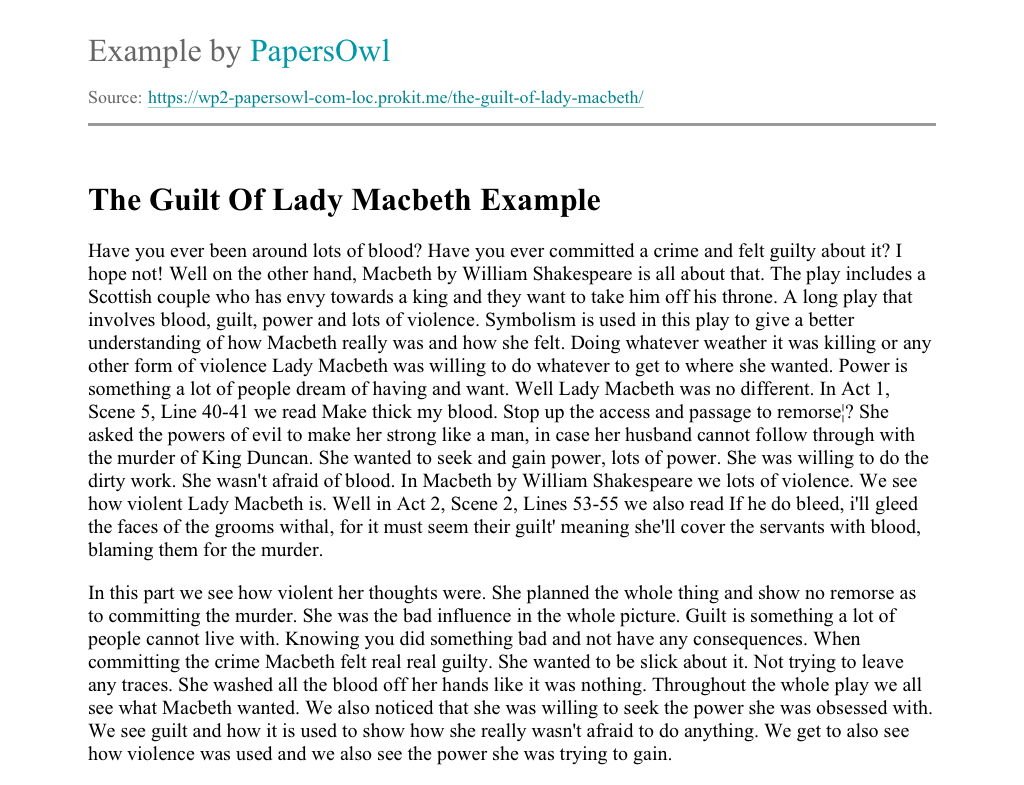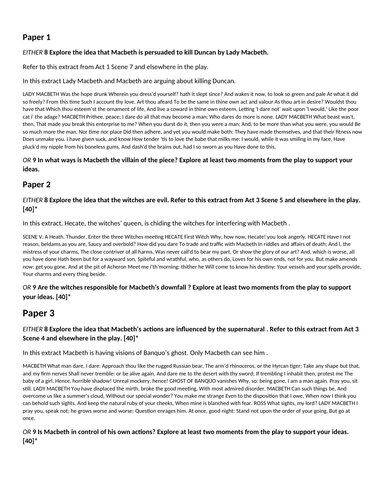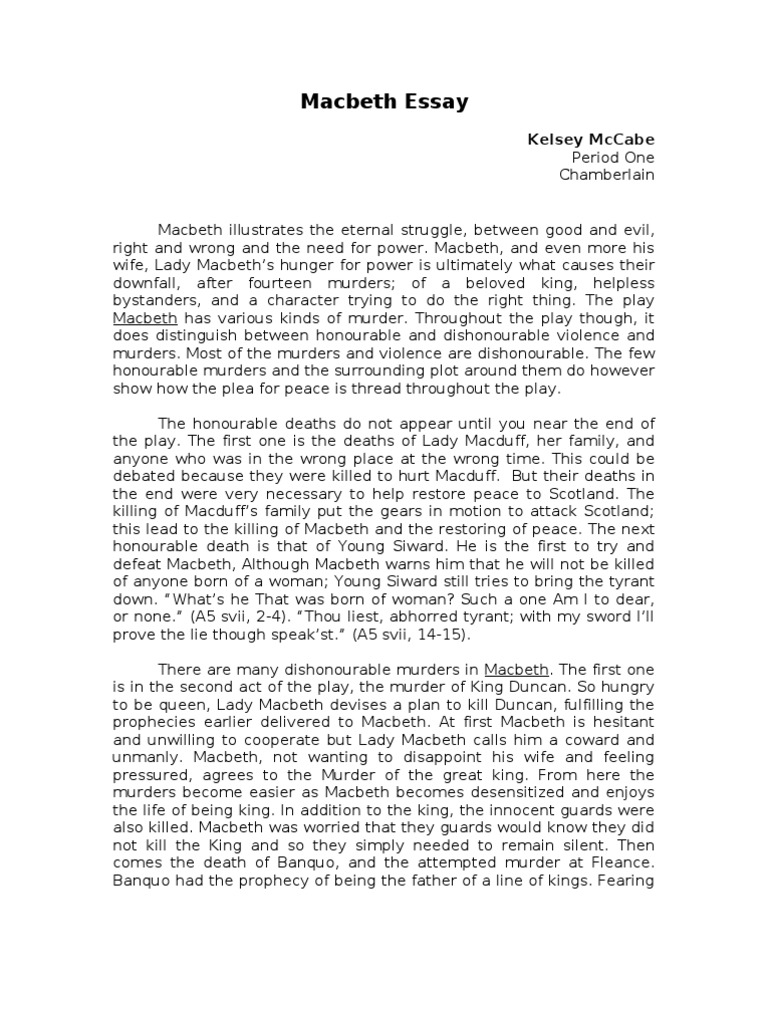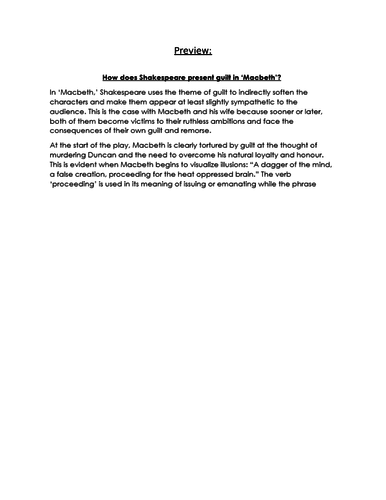
Related essays
At the beginning of “Macbeth”, Macbeth is a true soldier who has no guilt within himself and he is proud of killing people fighting in battles. Once he has murdered King Duncan, his is haunted with guilt, he cannot sleep, enter a room and he is full with agony. This leads him to Macbeth’s guilt develops into three main levels. The first being overall guilt and feeling bad, then progressing into madness and delusions, and finally into feeling not much at all for what he has done over the course of the play. Macbeth first feels guilt after feeling Duncan, like any human being would feel after killing another human being 02/11/ · Guilt is essential in Macbeth, because it evokes our conscience to feel emotion and regret. Macbeth, is written by William Shakespeare, a story about a power-hungry and ambitious leader who does many vicious acts to gain power. After murdering Duncan and hiring people to kill his friend Banquo, Lady Macduff and her son he feels major guilt

Recent Posts
The theme of guilt is expressed by Lady Macbeth, through blood imagery and Macbeth’s internal conflict. Guilt is a major factor in people’s lives and will continue to haunt the characters of Macbeth for a long time. Guilt can be a result of many things, as it 10/10/ · A person’s guilt will always manifest itself very quickly on its terms that cannot be hidden for long which is a hard psychological experience for many. The Macbeth play is partially based on guilt which comes to the surface when the characters have done something they already know and feels it’s wrong Guilt, or described by Macbeth as “Life’s fitful fever”, is prevalent in all of our lives. In some cases, guilt is perceived as a destructive and consequently pointless emotion, stemmed from the fear of judgment or the burden of insecurity that can lead to paranoia Macbeth Guilt Macbeth Topics: Guilt, Madness, Moral Decay

You may also like
Macbeth Guilt Essay Good Essays Words 5 Pages Open Document William Shakespeare’s Macbeth is a tragedy in which the plot evolves in great accordance to the guilt that the individual characters feel. The guilt starts with the planning and execution of the murder of King Duncan. To this event Lady Macbeth and Macbeth react in different ways Guilt, or described by Macbeth as “Life’s fitful fever”, is prevalent in all of our lives. In some cases, guilt is perceived as a destructive and consequently pointless emotion, stemmed from the fear of judgment or the burden of insecurity that can lead to paranoia Macbeth Guilt Macbeth Topics: Guilt, Madness, Moral Decay Shakespeare presents guilt through Macbeth’s mental suffering, ‘a dagger of the mind’, ‘O full of scorpions is my mind’. The words ‘dagger’ and ‘scorpions’ have connotations of danger and fatality. Macbeth is warning himself subconsciously through hallucinations, demonstrating how guilt will bind him to sorrow
Related Essays
‘threads of Suffering and Guilt’ in William Shakespeare's Macbeth Guilt is the fact of having committed a specified or implied offence or crime. It is the conscious voice that has the ability to cause humans to become insane. When guilt becomes a heavy burden, the effects it has on the human character go much 6 Pages | Words Guilt, or described by Macbeth as “Life’s fitful fever”, is prevalent in all of our lives. In some cases, guilt is perceived as a destructive and consequently pointless emotion, stemmed from the fear of judgment or the burden of insecurity that can lead to paranoia Macbeth Guilt Macbeth Topics: Guilt, Madness, Moral Decay 10/10/ · A person’s guilt will always manifest itself very quickly on its terms that cannot be hidden for long which is a hard psychological experience for many. The Macbeth play is partially based on guilt which comes to the surface when the characters have done something they already know and feels it’s wrong

Related Topics
Shakespeare presents guilt through Macbeth’s mental suffering, ‘a dagger of the mind’, ‘O full of scorpions is my mind’. The words ‘dagger’ and ‘scorpions’ have connotations of danger and fatality. Macbeth is warning himself subconsciously through hallucinations, demonstrating how guilt will bind him to sorrow Guilt, or described by Macbeth as “Life’s fitful fever”, is prevalent in all of our lives. In some cases, guilt is perceived as a destructive and consequently pointless emotion, stemmed from the fear of judgment or the burden of insecurity that can lead to paranoia Macbeth Guilt Macbeth Topics: Guilt, Madness, Moral Decay 10/10/ · A person’s guilt will always manifest itself very quickly on its terms that cannot be hidden for long which is a hard psychological experience for many. The Macbeth play is partially based on guilt which comes to the surface when the characters have done something they already know and feels it’s wrong
No comments:
Post a Comment